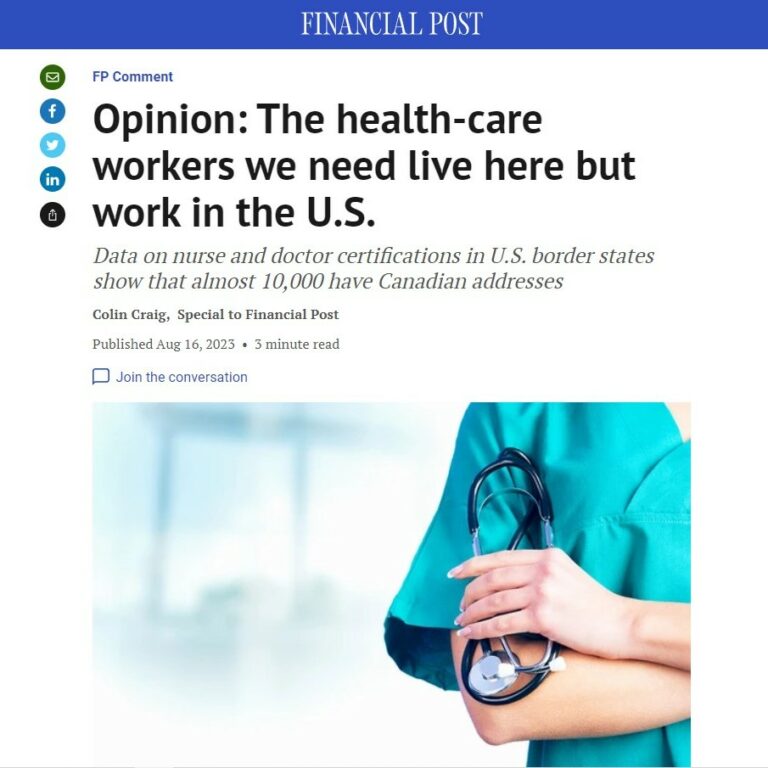Canada’s health-care system is not quite at that level of desperation, but elected officials routinely talk about the nation’s shortage of health workers — usually as part of discussions about training more doctors and recruiting more staff from abroad.
FINANCIAL POST COLUMN – The health care workers we need live here but work in the U.S.

Imagine you’re in a hospital delivery room welcoming your newborn into the world. As joy fills your heart you notice a strange figure at the back of the room. You focus in and see the hospital’s janitor taking off a mask and scrubs. He catches your glare and mouths the words “doctor shortage.”
Those approaches can be helpful, but new SecondStreet.org research shows two other measures are worth considering: recruit Canadian health workers who live in Canada but commute to the U.S. for work, and spend more time convincing current staff not to leave in the first place.
Data we’ve collected shows U.S. border states have issued nurse and physician licences to 9,788 health-care workers with Canadian mailing addresses. That’s roughly half an NHL-sized arena full of staff.
To be sure, just because a health worker has a licence in the U.S. does not mean he or she actually commutes across the border for work every day. On the other hand, earlier this year SecondStreet.org conducted a detailed survey of Ontario nurses who currently have Michigan licences. We found that approximately two-thirds of those who live in Canada do commute to the U.S., while another eight per cent are hoping to work in the U.S. in the future.
It’s important to note this research only involved data from border states. California, Florida, Texas and other appealing states deeper in the United States have also attracted thousands of Canadian health-care workers. According to the Commission on Graduates of Foreign Nursing Schools, a U.S. body that confirms education credentials, it certified 2,550 Canadian nurses to work in the U.S. last year alone.
You might think “better compensation” would be the main reason Canadian staff work in the U.S., but the Ontario survey found that “availability of work” was actually the most common reason.
Angela Henry, a nurse who lives in Canada but works in Detroit, told SecondStreet.org that after moving to Windsor she could only find part-time nursing work. So she chose to work instead at a Detroit hospital that offered her both full-time work and greater control over her schedule.
Cheryl Cascio, another Canadian nurse who works in Detroit, echoed these comments. She told SecondStreet.org she doesn’t want to work multiple nursing jobs just to earn a full-time salary. Her U.S. employer was able to provide her with a stable schedule rather than the volatility that comes with chasing shifts in Ontario. Moreover, full-time work comes with benefits.
Better compensation was the second most common reason nurses gave for working in the United States. Better working conditions came third. Some survey respondents even raised concerns about working in unionized environments (including ranking low in terms of seniority if they returned to work in Canada) and the lower level of health-care technology in Canada. None of this reflects well on Canada’s health-care system.
There are a couple of important takeaways from this research.
First, government-run health-care facilities could try recruiting Canadian health-care workers who commute to the U.S. for work. In some cases, this may require a new approach to respond more effectively to the kinds of working conditions people are seeking. Perhaps nurses’ unions could be more flexible on seniority and other work rules if this would help hospitals ensure they have enough staff to serve patients.
Second, more and more provincial governments are partnering with private clinics to provide health services to patients in the public system. This is a positive development for health-care workers as it gives them more choice in terms of where to work. In addition, private clinics may be more responsive to the better working conditions doctors and nurses are seeking.
One thing is certain. Part of solving Canada’s health-care shortage is right under our nose. If governments don’t seize this opportunity, perhaps private clinics will.
Colin Craig is president of SecondStreet.org, a think-tank.
This column was published in the Financial Post on August 16, 2023.
You can help us continue to research and tell stories about this issue by making a donation or sharing this content with your friends. Be sure to sign up for our updates too!


